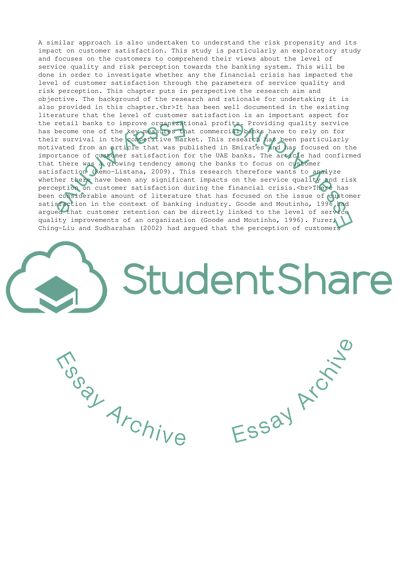Cite this document
(An Exploratory Study Of Service Quality & Risk Propensity In Enhancing Thesis Proposal, n.d.)
An Exploratory Study Of Service Quality & Risk Propensity In Enhancing Thesis Proposal. https://studentshare.org/finance-accounting/1827767-an-exploratory-study-of-service-quality-risk-propensity-in-enhancing-customer-satisfaction-in-islamic-retail-banking-in-the-light-of-the-recent-financial-crisis-in-uae
An Exploratory Study Of Service Quality & Risk Propensity In Enhancing Thesis Proposal. https://studentshare.org/finance-accounting/1827767-an-exploratory-study-of-service-quality-risk-propensity-in-enhancing-customer-satisfaction-in-islamic-retail-banking-in-the-light-of-the-recent-financial-crisis-in-uae
(An Exploratory Study Of Service Quality & Risk Propensity In Enhancing Thesis Proposal)
An Exploratory Study Of Service Quality & Risk Propensity In Enhancing Thesis Proposal. https://studentshare.org/finance-accounting/1827767-an-exploratory-study-of-service-quality-risk-propensity-in-enhancing-customer-satisfaction-in-islamic-retail-banking-in-the-light-of-the-recent-financial-crisis-in-uae.
An Exploratory Study Of Service Quality & Risk Propensity In Enhancing Thesis Proposal. https://studentshare.org/finance-accounting/1827767-an-exploratory-study-of-service-quality-risk-propensity-in-enhancing-customer-satisfaction-in-islamic-retail-banking-in-the-light-of-the-recent-financial-crisis-in-uae.
“An Exploratory Study Of Service Quality & Risk Propensity In Enhancing Thesis Proposal”. https://studentshare.org/finance-accounting/1827767-an-exploratory-study-of-service-quality-risk-propensity-in-enhancing-customer-satisfaction-in-islamic-retail-banking-in-the-light-of-the-recent-financial-crisis-in-uae.


